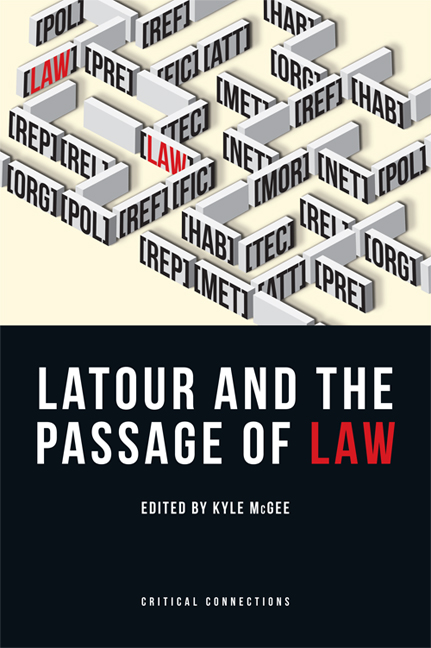Book contents
- Frontmatter
- Contents
- Introduction
- 1 From the Conseil d’État to Gaia: Bruno Latour on Law, Surfaces and Depth
- 2 Politics and Law as Latourian Modes of Existence
- 3 On Devices and Logics of Legal Sense: Toward Socio-technical Legal Analysis
- 4 ‘The Crown Wears Many Hats’: Canadian Aboriginal Law and the Black-boxing of Empire
- 5 Providing the Missing Link: Law after Latour's Passage
- 6 The Life and Deaths of a Dispute: An Inquiry into Matters of Law
- 7 Plasma! Notes on Bruno Latour's Metaphysics of Law
- 8 The Conditions of a Good Judgment: From Law to Internal Affairs Police Investigations
- 9 In The Name of the Law: Ventriloquism and Juridical Matters
- 10 Laboratory Life and the Economics of Science in Law
- 11 Bartleby, Barbarians and the Legality of Literature
- 12 The Strange Entanglement of Jurimorphs
- List of Contributors
- Index
4 - ‘The Crown Wears Many Hats’: Canadian Aboriginal Law and the Black-boxing of Empire
Published online by Cambridge University Press: 05 September 2016
- Frontmatter
- Contents
- Introduction
- 1 From the Conseil d’État to Gaia: Bruno Latour on Law, Surfaces and Depth
- 2 Politics and Law as Latourian Modes of Existence
- 3 On Devices and Logics of Legal Sense: Toward Socio-technical Legal Analysis
- 4 ‘The Crown Wears Many Hats’: Canadian Aboriginal Law and the Black-boxing of Empire
- 5 Providing the Missing Link: Law after Latour's Passage
- 6 The Life and Deaths of a Dispute: An Inquiry into Matters of Law
- 7 Plasma! Notes on Bruno Latour's Metaphysics of Law
- 8 The Conditions of a Good Judgment: From Law to Internal Affairs Police Investigations
- 9 In The Name of the Law: Ventriloquism and Juridical Matters
- 10 Laboratory Life and the Economics of Science in Law
- 11 Bartleby, Barbarians and the Legality of Literature
- 12 The Strange Entanglement of Jurimorphs
- List of Contributors
- Index
Summary
Introduction
Latour's The Making of Law encouraged us to think about ‘law’ as a set of overlapping networks in perpetual motion, networks in which such lowly entities such as paper clips, wooden mailboxes and file folders play important roles (Latour 2010; Levi and Valverde 2008). Latour's approach and choice of object of study are in keeping with much of today's legal anthropology, in part because today's legal anthropologists are more likely to be doing fieldwork in the backrooms of constitutional courts and even central banks than to be investigating the norms and ‘customs’ of Pacific Islanders (e.g. Riles 2011).
Our contribution to this volume is at one level a study that echoes Latour's and Riles’ work on the anthropology of legal modernity (Mundy and Pottage 2004; Latour 2010). But since we will here highlight an innovative re-assembling of certain legal actors that reek of pre-modernity – those associated with the British/imperial/Canadian ‘Crown’ – it might be more accurate to say that our study shows how the modern v. pre-modern binary deconstructs itself in a legal assemblage elaborated mainly by means of current-day Canadian judicial decisions regarding aboriginal rights, an assemblage that makes strikingly novel use of very ancient notions about monarchs and their material and spiritual accoutrements.
‘The Crown’ – an ontologically hybrid term if there ever was one (Latour 1987) – is one of the most frequently used terms of Canadian law. It is found, with performative effects, in lofty documents, such as treaties between states or between the Canadian government and aboriginal nations. But it is also mechanically reproduced thousands of times a day in criminal proceedings, which are always styled Regina or Rex – abbreviated ‘R.’ – v. Smith or R. v. Jones. The genderless ‘R.’ is thus an interesting actor. It is first of all a tiny printed letter serving as a label telling the reader that a criminal prosecution is at work, a letter whose effective legal meaning is exactly the same as that of the US phrase ‘The people of the state of X’.
- Type
- Chapter
- Information
- Latour and the Passage of Law , pp. 93 - 121Publisher: Edinburgh University PressPrint publication year: 2015



